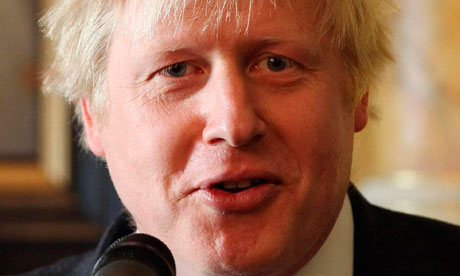News International's offers to Boris Johnson revealed in Leveson evidence
Documents show NI discussed providing millions of pounds for academy and cable car during phone-hacking investigation

Boris Johnson called the phone-hacking disclosures 'codswallop cooked up by the Labour party' in 2010. Photograph: Dan Kitwood/PA
Fresh details of how News International (NI) apparently sought goodwill by dangling two offers of sponsorship in front of the London mayor, Boris Johnson, are contained in evidence published by the Leveson inquiry.
In September 2010, Johnson publicly attacked the hacking disclosures, calling them party political "codswallop".
Documents subsequently revealed that NI was at the time offering him £2m towards an academy school in London and talking of donating millions more to sponsor another Johnson project, a cable car crossing the river Thames.
At the end of 2010, according to emails published by Leveson, the NI executive Will Lewis asked colleagues: "Where are we with the schools project, particularly Boris securing the land and Michael Gove [the education secretary] the capital investment?"
An internal meeting on the subject was arranged at the company's Wapping HQ with James Murdoch. Lewis also discussed the cable car sponsorship with colleagues. He wrote on 11 January 2011: "Re cable cars … Transport for London have submitted their original planning application and are awaiting the results next month. Once granted, we can hopefully jump in – if we want to."Both offers were, however, dropped shortly afterwards.
Police reopened a criminal investigation into phone hacking, and the News of the World's former editor Andy Coulson was forced to resign as the prime minister's press secretary.
"In the end, I'm afraid News International didn't produce a sausage," the mayor told the radio presenter Nick Ferrari on LBC 97.3 this week.
In words that subsequently proved embarrassing, Johnson told the London assembly the hacking disclosures were "a load of codswallop cooked up by the Labour party".
He did not mention at the time that he was in commercial talks with NI to obtain sponsorship for two prestige projects.
When he was challenged at a press conference the following July, after the assistant commissioner at Scotland Yard, John Yates, had been forced to resign over the hacking scandal, he said: "OK, I misunderstood the severity of the allegations but that was actually because no one had briefed me."
He added: "I had a very, very clear briefing from the police, from John [Yates] that there was nothing new in these allegations."
Johnson's sponsorship dealings with NI began in June 2010, shortly after David Cameron became prime minister, when, according to the emails released alongside Rupert Murdoch's testimony to the Leveson inquiry, he held a meeting with Rebekah Brooks, then the NI chief executive.
They discussed the prospects of NI putting up £2m to become the "lead sponsor" of what was to be called the "News Academy" in east London. Brooks was apparently enthusiastic and Johnson referred her to the London Development Agency, which offered a site in the former Royal Docks and introduced her to Newham council.
At the same time, Johnson was looking for up to £36m in commercial sponsorship for a cable-car crossing of the river in Docklands in time for the Olympics, which could carry News International branding.
On 4 July he announced: "The aim is to fund the construction of the scheme entirely from private finance and discussions are ongoing with a number of private sector organisations that have expressed interest in the project."
On 4 September, a few days before the New York Times hacking revelations, the emails disclose that Johnson was actively working on the academy scheme, and met Gove to try to persuade him to release enough Whitehall cash for a new school building.
Johnson's lobbying appeared to reach its height on 30 November, in east London, when he met James Murdoch, accompanied by Brooks and the editor of the Times, James Harding, as well as Gove himself.
According to his hospitality register, after an inspection of a potential academy site alongside the Royal Docks, the party adjourned to the new Forman's smoked salmon restaurant at the Olympic Park and a Transport for London official made a presentation about the cable-car scheme.
Johnson's hopes for money from the Murdochs came to nothing. The academy was never built, with NI blaming its pullout on the failure of Gove's department to provide the bulk of the capital required for a new school building. Emirates airline did eventually offer to sponsor part of the cost of the cable car.
In the runup to the mayoral elections, Johnson lost his temper when challenged by BBC London's political editor, Tim Donovan. He said on-air that such questions about his dealings with NI were "fucking bollocks".
In an interview with the Guardian in March, Johnson said the "implosion of [Rupert] Murdoch's power has been the single biggest political event of the past three years", but added: "I don't regard him as quite the satanic influence that some do and if you look at the newspaper industry he did a great deal to set it free, and that is a point you don't often hear these days."
http://www.guardian.co.uk/media/2012/may/02/news-international-boris-johnson-leveson?CMP=twt_fd
